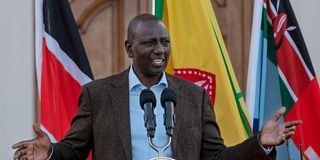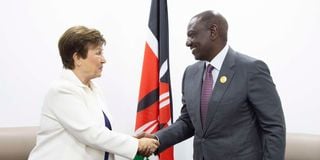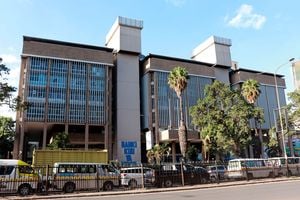
President William Ruto.
President William Ruto’s administration must implement radical measures like cutting wasteful spending, reducing the State’s borrowing appetite and settling about Sh794 billion owed to businesses to inject cash in the private sector to boost production in order to lower the runaway public debt burden.
To begin sorting the huge pending bills, the government is advised to implement a five-year staggered payment plan starting with allocating Sh150 billion this year, to “inject liquidity in the private sector thereby stimulating productivity”.
And to progressively lower the debt to 55 per cent as legally required, government must tighten public procurement controls, end reckless spending by State agencies under the guise of emergencies and streamline taxation to attract private investors, the Parliamentary Budget Office (PBO) has advised.
The PBO, in a new report with insights on strategies to scale down Kenya’s public debt, reckons that the government must take a mix of painstaking deliberate actions to cut wastage and seal loopholes being exploited by corruption cartels to steal from government, while at the same time invigorating the business environment by creating stability in its taxation and stabilising the shilling. The two, the PBO observes, have created uncertainty for potential local and foreign investors with an interest in setting up shop in Kenya, which is denying the government much needed revenues.
“The proposed options are designed to foster fiscal responsibility, transparency and efficiency, while supporting inclusive economic growth,” the PBO says in the report titled ‘Budget Options for 2024/25 and the medium term’.
The recommendations come at a time when the total public debt stock hit Sh11.14 trillion by end of December 2023.
The PBO, for i nstance, notes that pending bills which are estimated at Sh794 billion currently have dampened the economy by denying businesses cash flows, a factor that has further affected banks and Saccos, which are now witnessing an increase in non-performing loans (NPLs), as businesses default.
The government’s continued holding of billions of cash belonging to businesses, economic experts at the PBO believe, affects the overall economic well-being as it limits productivity of businesses and their capacity to employ, which has far-reaching ramifications on government revenues.
The office proposes that the government should set aside Sh150 billion annually over the next five years to settle the pending bills to boost cash flows in businesses, noting that the staggered settlement would minimise pressures for the government and allow it to use a mix of taxes and concessional loans to settle the bills.
“The payment of pending bills will inject liquidity in the private sector, thereby stimulating private sector productivity. These delayed payments have affected private sector liquidity and profitability, thereby dampening continued investment in businesses that have contracts with the government,” the PBO noted.
The budget office also notes that it’s crucial for the government to address uncertainty that currently prevails in Kenya’s business environment, to enhance the productivity of the private sector.
It notes that the uncertainty stems from existing macroeconomic challenges, “such as depreciating shilling, debt repayment pressure, and an ever-changing taxation regime”.

President William Ruto meets with IMF Managing Director Kristalina Georgieva.
“Among various other solutions, the government may aim to address challenges in the tax regime, including more business-friendly tax administration, improving the balance of payments through measures to address exports, and incentivising Foreign Direct Investment (FDI),” the PBO says.
“The government can also undertake targeted technical and financial support through the Financial Inclusion Fund (Hustler Fund) for specific export-oriented firms, including value addition, value chain coordination, and ensuring compliance with specific standards appropriate to the export market.”
To lower the public debt stock to 55 per cent of GDP by 2029, the PBO says, Treasury needs to limit budget deficits at a maximum of four per cent of the GDP, which would mean that the government must lower its borrowing appetite and stop raising borrowing targets after budget approval.
The government had originally planned to borrow Sh718 billion during the current financial year, which ends in June, but later revised the borrowing target to Sh886 billion in the first supplementary budget issued in December. The 2024 Budget Policy Statement (BPS) has yet again revised the borrowing target downwards to Sh785 billion, and projects that borrowing in the year starting July will be Sh704 billion.
“Target a 1.6 per cent primary surplus. To achieve the desired primary surplus, the fiscal deficit should not exceed four per cent of GDP which is equivalent to Sh721.8 billion in FY 2024-2025,” the PBO advises.
The budget office further wants tighter controls to seal loopholes that have been exploited by State agencies to spend billions of shillings outside Public Finance Management (PFM) guidelines in the name of emergencies, much of which have been wasted.
The abuse of spending under Article 223 of the Constitution — which provides room for spending of public money that had not been approved in budget in case of an emergency — has been witnessed across government, from highest levels including State House.
This has seen spending under the budget line grow from Sh1.1 billion in 2014/15 to more than Sh147 billion in 2022/23, according to a special audit released in December.
Between July and December last year, the Controller of Budget rejected 25 requests to spend Sh47 billion under the emergency clause. Most of the requests were for expenditures that ranged from luxuries to some that could have been planned for in the original budget.
State House, for instance, was denied two requests to spend Sh400 million on purchase of vehicles and Sh700 million to put up a presidential dais at State House Gardens.
The PBO wants the PFM Act amended to ‘eliminate ambiguities on what constitutes unforeseen and unavoidable circumstances’.
To streamline public procurement, perhaps the biggest corruption hole in Kenya, the PBO has also proposed the establishment of centralised e-procurement platforms that bring all government procurements to one pot that can be seen by all, and the simplification of processes to be accessed by any Kenyan through mobile phones.
The office argues that consolidating procurement activities across government agencies would promote economies of scale for government, standardisation, and better negotiation power with suppliers.
The PBO also notes that duplication of roles among various government agencies continues to cost taxpayers heavily. “A review of government expenditure indicates that duplication in mandates among MDAs amounts to an estimated Sh8.8 billion. A savings of this amount can be directed towards payment of pending bills and the balance on high-impact social programmes,” it observes.
The advice by PBO is in the context of the recently adopted debt anchor of 55 per cent of GDP in present value terms, which Treasury targets to achieve by 2029. The office, however, reckons that to achieve the ambitious target, the government must clean its house by cutting wastage, and providing businesses with an environment to thrive.
“In this regard, the national government’s strategy over the next four years should be to strategically implement fiscal consolidation to slow down debt accumulation while restructuring government spending to focus on policies and programmes with high social impact, high returns on investment, and the ability to crowd in private sector investment,” the PBO says.
The office warns that in the financial year starting July, should the economic, revenue and expenditure performance stick to the trend witnessed in the past, Treasury could end up borrowing Sh937 billion, which would be Sh200 billion more than the ideal levels to achieve the debt to GDP ratio targets by 2029. Should the government undertake deliberate decisions to cut wasteful spending and upscale investment in the private sector which will increase revenues, however, the PBO notes that it will be able to borrow within projected allowable limits, which means it must not borrow beyond Sh722 billion in 2024/25.
The government is in the year ending June 2024 expected to spend more than Sh1.8 trillion on public debt service, with Sh597 billion having already been spent between July and December 2023.












